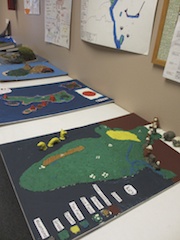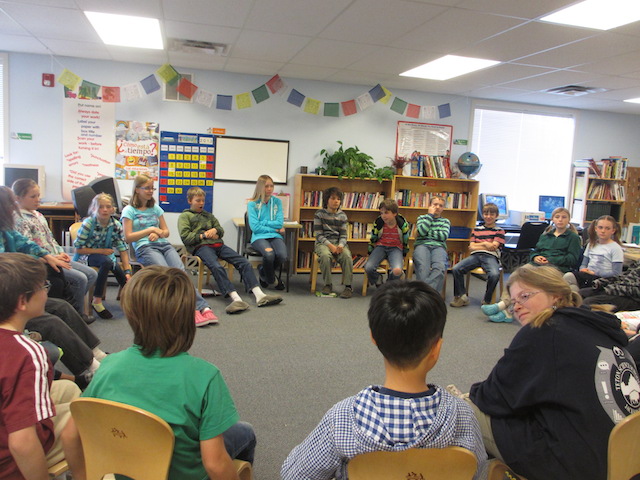|
|
Maria Montessori wrote: “My vision of the future is no longer of people taking exams and proceeding on that certification… but of individuals passing from one stage of independence to a higher (one), by means of their own activity, through their own effort of will, which constitutes the inner evolution of the individual.”
Montessori elementary students are placed in two groups: Lower elementary – age 6 to 9, and Upper elementary - age 9 to 12.
Instead of having strictly scheduled curriculum, Montessori elementary curriculum expands in response to students’ needs in each developmental stage. Each child participates in creating significant portions of his own work, and engages in individual and paired research projects beginning in first grade. This enhances the child’s motivation to work with and go beyond the hands-on project materials.
Montessori elementary students are allowed to work as long as they need to during extended periods of uninterrupted workshop time. The teacher is present to work as a consultant and facilitator. A Montessori child experiences their own mistakes through feed-back given by the project materials rather than by the teacher. Instead of judging and correcting, the teacher advises the use of different complementary materials, or present a material from a different angle.
The students are engaged in individual project work, small-group cooperative work, and large group lessons daily.
|
| |

|
 |
 |
| |
|
The elementary program builds on the preschool experience. The environment reflects a new stage of development and offers the following:
- Integration of the arts, sciences, geography, history, and language that evokes the native imagination and abstraction of the elementary child.
- Presentation of zoology, botany, anthropology, geography, geology, etc., exposing the child to accurate, organized information using formal scientific language and showing respect for the child's intelligence and interests.
- The use of manipulatives, timelines, pictures, charts, and other visual aids to provide a linguistic and visual overview of the first principles of each area of study.
- Presentation of knowledge as part of a large-scale story that unfolds the origins of the earth, life, human communities, and modern history, always in the context of the wholeness of life. The child's study of detail in reference to the Great Lessons leads to awe and respect for the totality of knowledge.
- A mathematics curriculum presented with concrete materials that simultaneously reveal arithmetic, geometric, and algebraic correlations.
- Emphasis on open-ended research and in-depth study using primary and secondary sources as well as other materials.
- Montessori-trained adults who are "enlightened generalists" (teachers who are able to integrate the teaching of all subjects, not as isolated disciplines, but as part of a whole intellectual tradition).
- Use of community resources beyond the four walls of the classroom such as field trips and Teton Science School.
- Studies are integrated not only in terms of subject matter but in terms of moral learning as well, resulting in appreciation and respect for life, moral empathy, and a fundamental belief in progress, the contribution of the individual, the universality of the human condition, and the meaning of true justice.
|
|
|
|
|
May
5/8: Board Meeting 6:30 pm
5/9: Art & Music Show 6:00 pm
5/21: LE Feast 11:30 am
5/22: 6th Year Graduation
5/23: Last Day of School
5/24: SRMS Closed
5/27-5/31: SRMS Closed
Summer Program
June 3rd - August 16th
Closed July 1st - 5th
24-25 Supply Lists
Kindergarten
Lower Elementary
Upper Elementary
|
|
|
|
|
|
 |
 |
 |
Snake River
Montessori School
2970 E. 1st Street
Ammon, ID 83406
Phone: 208.524.4730
|
|
|



